Few Americans and Chinese today know the fame, glory and controversies of General Stilwell, who served as the Chief of Staff of Allied Forces in the China-Burma-India Theatre. As one of the most important yet controversial figures of WWII, General Stilwell left an intriguing legacy for historians to study and scrutinize. This essay, neither a judgment of General Stilwell’s military career nor a defense of him over his conflicts with other historical figures, is an honest review of his faith in and friendship with the common Chinese people.
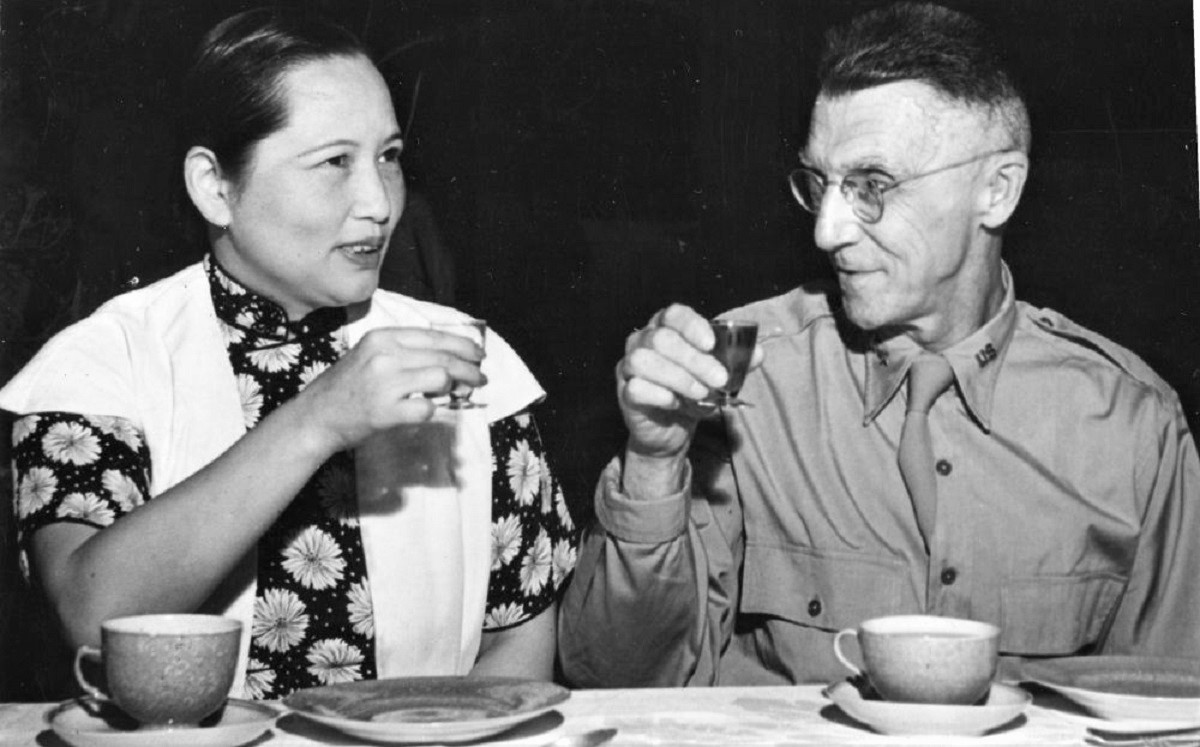
Song Ching Ling and Stilwell.
After the passing of General Stilwell, his two daughters, Nancy and Alison, carried on their father’s good will towards the Chinese people, even in the chilly days of the Cold War when the relations between China and America were contentious. They later set up a scholarship to help Chinese students study in America.
Impressed with and inspired by the sisters’ generosity and devotion to the Chinese people, Dr. Peter C. C. Wang, Founder and CEO of the Wang Foundation, and his wife, Dr. Grace Wang, have contributed to the Stilwell Scholarship since 2013. They have also sponsored DingDing TV’s interview of John Easterbrook, General Stilwell’s grandson, in order to help people learn more about the military and political alliance between China and America during WWII, as well as recognize the efforts of three generations of the Stilwell family to promote Sino-American friendship.
For the past three decades every autumn a young Chinese graduate student receives a private scholarship to study at Monterey Institute of International Studies (now the Middlebury Institute of International Studies…MIIS). Many of them were surprised when given the award because they could not believe an American family who did not know them personally would so generously contribute to their study. But once they came here, they soon learned that the scholarship was a gift of love from an extraordinary American family to the Chinese people.
This family’s relationship with China began about a hundred years ago when a young American officer named Joseph Stilwell was assigned to Beijing (spelled as Peking at that time) to study Chinese. His outstanding linguistic ability enabled him to complete all the school courses very quickly and then he hired a private tutor to further his studies. His tutor, Mr. Guan, a traditional Chinese scholar, was a Mandarin official at the Manchu Court before the establishment of the Republic of China in 1911. Stilwell and his family grew so close to Mr. Guan that they invited him to live with them. As a result, not only did Stilwell become proficient in Chinese, his children were also introduced to Chinese language and culture. His oldest daughter, Nancy, was especially good in Chinese and was regarded as the family linguist. His younger daughter, Alison, studied with several famous Chinese artists and learned to paint in the traditional ink and wash style.
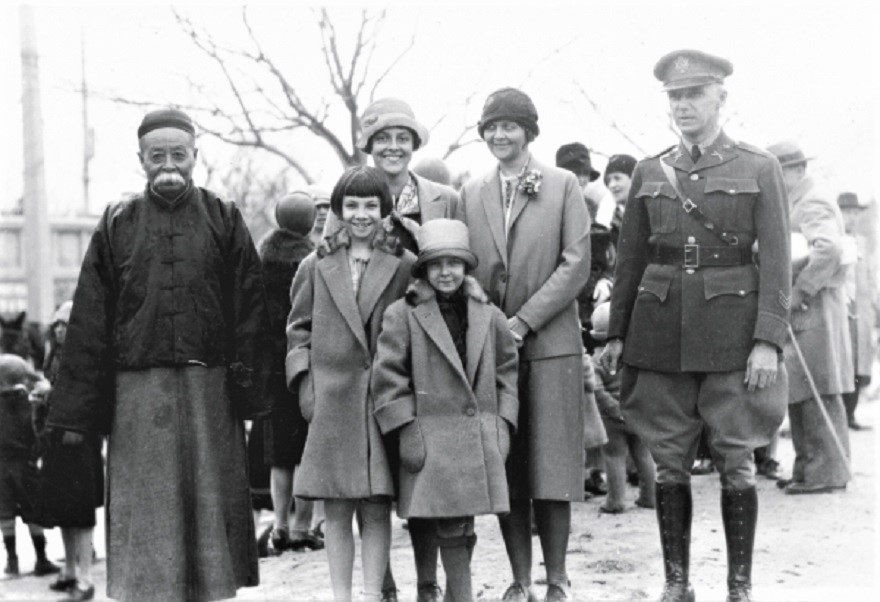
Mr. Guan and the Stilwell family.
In 1921, Stilwell was selected by the Red Cross to be the chief engineer building a famine relief road in Shansi province. Knowing the Chinese language and working side-by-side with Chinese workers Stilwell had a unique opportunity to gain a deep understanding and appreciation of the Chinese people.
China in the 1920s was a famine-stricken land overrun by warlords and foreign powers. Yet despite the war and poverty, the Chinese common folks (lao bai xing) maintained their dignity, integrity, optimism and even a sense of humor. Stilwell was so impressed with the lao bai xing that he never ceased to admire them. Awed by their diligence, intelligence and tenacity, Stilwell recognized their great strength at a time when many Chinese intelligentsia and literati failed to do so. For the rest of his life Stilwell became an enthusiast of lao bai xing and foresaw the enormous potential of the Chinese people long before the world began to realize the awakening of China.
Between his tours of duty in China, Stilwell served in several military positions in America. His candid and even sharp style earned him the famous nickname “Vinegar Joe.” While he was training the 7th Infantry Division at Fort Ord, California, he minimized ceremony and focused on the concerns of the average soldier, who affectionately called him another nickname: “Uncle Joe.”
After the United States entered WWII, Stilwell was initially selected to plan and command the Allied invasion of North Africa. But because of his proficiency in Chinese and his experience as military attaché to China, he was assigned as the Chief of Staff to Generalissimo Chiang Kai-Shek, the supreme leader of China at the time.
When Stilwell first arrived in the China-Burma-India Theater in early 1942, the Japanese had already invaded Burma. British and Chinese forces were in Burma trying to stop the Japanese. Chiang Kai-shek sent Stilwell to Burma to command the Chinese forces; however, Chiang was issuing orders directly to his forces from hundreds of miles away, orders that frequently countermanded Stilwell’s orders. Defenses collapsed and forces disintegrated. Stilwell eventually had to lead a heterogeneous party of 114 people on foot through the jungles of Burma to safety in India. His was the only party to reach India without the loss of life.
Stilwell had long believed that given the proper training, equipment, food, and medical care the Chinese soldier could be the equal of any soldier in the world. While in Burma he was already putting plans together to train and equip Chinese forces in India for an eventually campaign to retake Burma.

Marching out of the jungle.
Stilwell established a training camp in India and sent the remnants of two divisions of Chinese soldiers who had retreated from Burma to the camp. Under his command, the Chinese troops went through re-organization and modernization, eventually becoming a competent fighting force which decisively defeated the Japanese troops in northern Burma in 1944. Stilwell’s leadership style emphasized concern for the welfare of the individual soldier. One manifestation of that concern was the training facility he established for disabled soldiers. At that facility the disabled soldiers learned a skill so they could make a living after leaving the military and returning to China.

General Stilwell and wounded Chinese soldiers.
With most of coastal China under Japanese control, Stilwell also pushed to open a land route to China from northern Burma and India so that American military supplies could be transported to China. The road network Stilwell pushed to build was called the Ledo Road, which was finally finished in January 1945. His drive to build the road helped to keep the Japanese forces out of northern Burma, which inadvertently helped his rival General Chennault transport supplies by plane more safely because American pilots no longer had to fly over the dangerous Hump. Upon its completion the Ledo Road was re-named the Stilwell Road in honor of his contribution.

The Stilwell Road.
After years of clashing with Chiang Kai-Shek, Stilwell was recalled to America in October 1944. He participated in the last days of the Okinawa campaign and attended the surrender ceremony of Japan aboard the battleship U.S.S. Missouri. Before returning to California, through his friend, General Marshall, Stilwell asked Chiang’s permission to go to Beijing to visit some old friends, but his request was rejected. In 1946, General Stilwell passed away in San Francisco.
In 1949, the Chinese Communists defeated Chiang Kai-Shek and formed a socialist government. In the subsequent two decades, there was little contact between Mainland China and America. Nancy and Alison, the two daughters of General Stilwell, tried their best to keep alive the Chinese traditions and culture they had known since childhood. In the early 1970s when China and America began to re-establish relations, they worked tirelessly to promote Sino-American understanding and friendship.
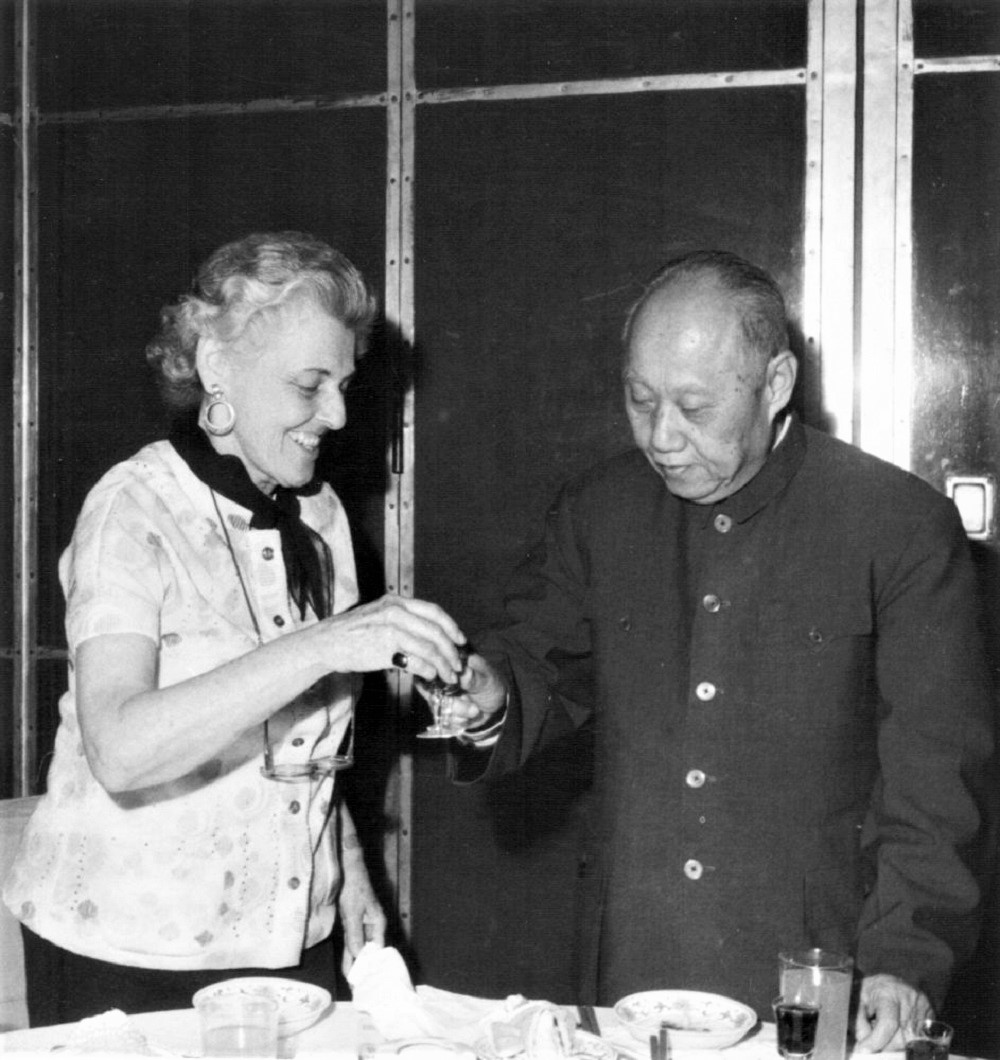
Nancy and Wang Bingnan.
In 1979, after the normalization of relations between China and America, Nancy and Alison were invited to visit China and were well received by many distinguished Chinese. General Stilwell’s contribution to the fight against the Japanese invaders and his good will towards the Chinese people were remembered and celebrated.
Madame Song Ching Ling, the widow of Dr. Sun Yatsen, the Founder of modern China, paid her tribute as follows: “General Stilwell always carried the interests of the Chinese people in his heart and he foresaw the strength and unity of the Chinese people creating a new and powerful China….I look on [him] as a great friend. His steadfastness in principle gave me reassurance in my work to help the people of China. The Chinese people will never forget his faith and friendship.”
Overwhelmed by the warm welcome they received in China, Nancy and Alison decided to pay back the kindness of the Chinese people by helping Chinese students or scholars to study in America. Working with the Monterey Institute of International Relations, they established the General Stilwell Scholarship Fund to assist a Chinese scholar studying for a master’s degree in Monterey. Along with volunteers, Nancy and Alison organized a variety of fundraising events, such as movie nights, art auctions and dinner parties, to support their cause. Every spring and autumn, they led a guided-tour to China, asking nothing for themselves, but donating the tour fee to the scholarship so that a Chinese scholar could fulfill his or her dream to study in America.
In her twilight years, Nancy bequeathed her rental property in Carmel to the Monterey Institute of International Relations. The Institute sold the house upon her death and the money received became the endowment for the Stilwell Scholarship. From its establishment till today, more than thirty Chinese scholars have benefited from this fund. Many of the scholarship recipients are now in Chinese academia, are leaders in the corporate world, or are entrepreneurs.
After Nancy passed away, her son, John Easterbrook, carried on the family tradition of preserving General Stilwell’s legacy and promoting friendship and understanding between China and America. The volumes of diary, papers and photos General Stilwell left are kept at the Hoover Archives at Stanford University. These original materials prove to be invaluable resources for historians, especially Chinese scholars who have little access to the Western resources. John has assisted several Chinese scholars to locate and obtain documents relating to the operations in the China-Burma-India Theater.
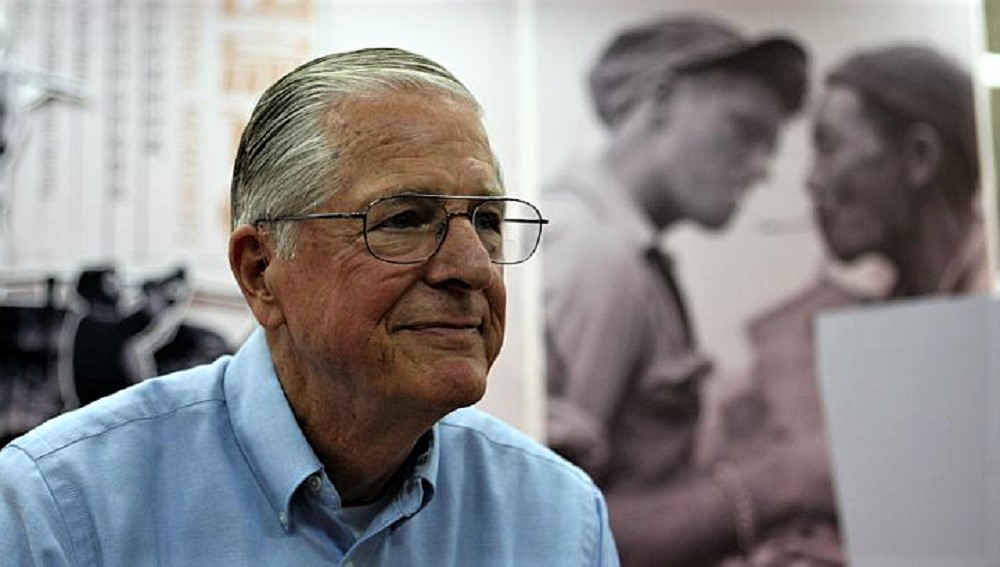
John Easterbrook.
Photos from the Stilwell family album turn out to be valuable not only to historians but also to descendants of the Chinese officers who served with General Stilwell. After the decades of political turmoil in China, many of them would have never seen the images of their forefathers if not for these photos.
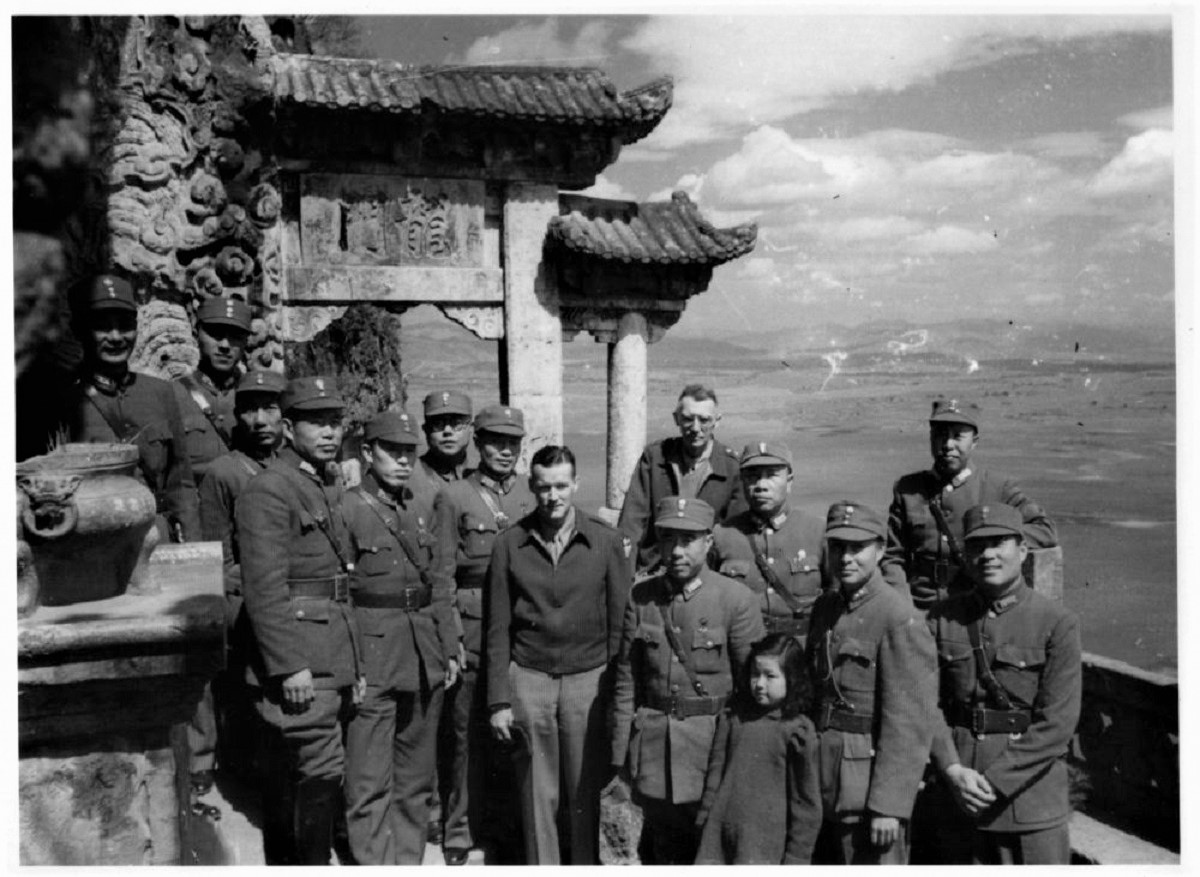
Stilwell and his Chinese officers.
In addition to stimulating interest in the legacy of General Stilwell, John is also busy raising more funds for the Stilwell Scholarship. He has solicited the help of two Monterey-based Chinese American entrepreneurs, Dr. Peter C.C. Wang and his wife, Dr. Grace Wang, who established the Wang Foundation in 2004 to promote educational and cultural exchanges between China and America.
Admiring the contribution of General Stilwell in the fight against the Japanese, Stilwell’s contributions to the Chinese people, and inspired by the tireless fundraising efforts of Nancy and Alison, Peter and Grace decided to contribute to the Stilwell Scholarship so that it can double the number of scholarships awarded. Since 2013 there have been two Chinese scholars continually in residence at MIIS. The scholarship sponsored by the Wang Foundations carries the name, The Wang Foundation-General Stilwell Scholarship.
Peter and Grace also sponsored DingDing TV’s interview of John in order to help people learn more about the military and political alliance between China and America during the WWII, as well as recognize the efforts of three generations of the Stilwell family to promote Sino-American friendship.

Dr. Peter C.C. Wang and Dr. Grace Wang.
There is much anxiety in America and around the world about China’s rapid ascendancy on the world stage. At this critical juncture of history, it is important to realize that America and China, the two most powerful nations on earth, if united, both shall prosper, if divided, both shall suffer (合则两利,斗则双败).
“No matter how a war starts, it ends in mud.” The cautionary words of General Stilwell still ring true today. In a way, the Wang Foundation-General Stilwell Scholarship has provided the world a good model for uniting people of different cultures through faith and friendship.